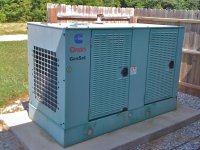On the pro and con list for NG or propane, add that the engines used in these generators are typically gasoline engines. The down side is the exhaust is much hotter with NG or Propane than with gasoline. Propane is the worst, NG is not quite as bad due to the lower energy content of the fuel. It's not uncommon to see the generator manufactures add their own exhaust manifold to a stock engine.
I've retrofitted a generator to my house and to our fire station. The house was propane, the fire station was NG. Common to both projects was the fact that the site and wiring cost were about half of the cost of the project.
Agree with others that a "tote and connect" backup is not too optimal. But if you do that, make sure the area is big enough for something down the road that is in a housing. This lets you spread the cost out over time.
At the fire station, we had to run a new 1" line to the 20 KW generator and put in a new meter. So you'll want to talk with your gas company at some point in the project to see what you need to do. On my propane unit, I ran a 10 PSI from the tank, to a 2 PSI on the generator, and in the generator this is a 3rd regulator close to the carburetor that makes about 7" of water of pressure. The NG unit at the fire station took whatever came from the street on the 1" line, and then had a 7" regulator in the generator. Again, work with your local gas company. They can also do the computations to size the lines for the run length you have. Size this for what you need to run the whole house.
Check with the gas company or local inspections department or your electrician regarding the site of the generator. Most places require you be 20 feet away from a window. Think about noise for both you and your neighbors.
On sizing the unit, you need to either get a clamp-on amp meter and do some measuring with the cover off of your breaker box, pay someone to do that if you are uncomfortable with that, or go by the ratings on the equipment you want to power. Take the amps of the largest compressor device like a heat pump or air conditioner and double the current so you have power to start the compressor. You just need to do this once for the largest device you have.
In any event, you'll need a list of what you power and how much power it takes. Only then can you make a "gotta have/can do without" list. Measurements are better than labels on the devices.
Whether you go whole house or just a few circuits you'll need to figure out the cost of re-wiring up those circuits to some device that is the transfer switch from the generator. I have 45 KW generator. When I made my list up for my all electric house, the resistive electric strips on the heat pumps were killing me. I ended up putting in a panel box before the transfer switch so I could transfer some of the "can do without" items to that panel. I ended up putting 15KW of heat strips and the block heater on that panel.
I also bought more generator because it was cheaper than buying new appliances. The point I'm trying to make here is that you should be sure to calculate the cost of all the wiring you have to do to use a smaller generator and see if you might be able to buy something bigger with that money and get something simpler/lest costly on the wiring side.
So you need to:
1) Make a list of what you have, what it draws, and how crucial it is.
2) Talk to your gas company and find out what it takes to get enough gas for running the whole house on a generator (even if you're just starting out small). You'll also find out if you can even have a "tote and plug" unit or if it has to be a fixed/permanent installation.
3) Figure out what all the wiring cost will be and what the various options are as far as panel before a whole house switch, cheaper "just 6 circuit" manual transfer switch, etc.
4) Plan your outside area to hold something big enough for the whole house (say a 4' by 8' pad) and bring the wiring and gas supply up next to the pad. You don't need to pour the big pad, just have the space available.
Then, the last step in the process is buying the generator and figuring out what wattage you need. While this planing is annoying, it's better than buying generators to see if they work and trying out different wiring and fuel supply options.
Finally, it is difficult to underestimate the level of spousal approval garnered with any automatic system. Even if you put 75% of your $$s into the transfer switch and start out with a small manual pull generator, after the 1st or 2nd outage you can look at a fixed generator. I bought my B21 so I could do my own install of the generator and propane tank. Nuff said there....:thumbsup:
Sorry for long post, lots of details as is typical with any big/fun project.
Pete
